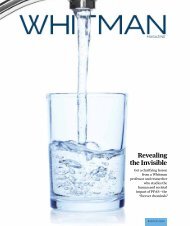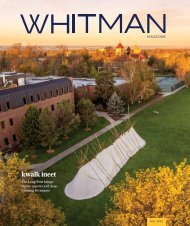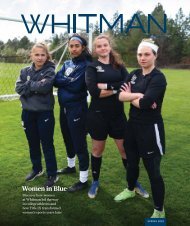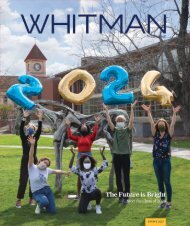Create successful ePaper yourself
Turn your PDF publications into a flip-book with our unique Google optimized e-Paper software.
Collaboration,<br />
critical thinking,<br />
creativity,<br />
research, analytical<br />
skills and writing,<br />
writing, writing.<br />
It might sound like a rundown of the<br />
top human skills demanded by the 21stcentury<br />
workplace. But these elements<br />
are also at the heart of <strong>Whitman</strong> <strong>College</strong><br />
students’ most challenging assignment of<br />
their college careers: the senior thesis.<br />
More than two-thirds of academic<br />
departments at <strong>Whitman</strong> require seniors<br />
to complete thesis projects. Some, like<br />
history, require the thesis only of honors<br />
students. (Other history students complete<br />
a shorter paper that serves as a capstone.)<br />
Students typically take a thesis-oriented<br />
course or independent study, where they<br />
get support for the process from faculty<br />
and other students.<br />
Beyond the written thesis, senior<br />
projects can vary markedly by major. For<br />
instance, seniors in the sciences typically<br />
expand on research they’ve done with<br />
a <strong>Whitman</strong> professor or as part of a<br />
summer research internship at another<br />
institution. Music performance majors<br />
participate in a senior recital. Computer<br />
science majors work as a team to design<br />
and implement an integrative project.<br />
Art majors create a work to be presented<br />
in the Sheehan Gallery Senior Thesis<br />
Art Exhibition. A thesis isn’t required<br />
for English majors; those who choose to<br />
write one might elect to write an analytic<br />
study of literary work or craft a work<br />
of poetry, fiction or creative nonfiction.<br />
Many majors require oral and/or written<br />
exams as part of or instead of the thesis.<br />
But no matter the student’s major, one<br />
thing everyone agrees on is that the thesis<br />
is a challenging endeavor. Even faculty are<br />
awed by how much students accomplish in<br />
a short period of time.<br />
“From my perspective, I couldn’t<br />
believe it was possible—that everyone<br />
is completing an empirical study in one<br />
year,” says Tom Armstrong, associate<br />
professor of psychology.<br />
Senior psychology students typically<br />
design their thesis study and write up<br />
the introduction and methods in the fall,<br />
says Armstrong. That leaves only a few<br />
months to collect and analyze data and<br />
write up the results, since they need to<br />
submit the thesis 10 days after spring<br />
break. “It’s a really condensed time frame<br />
for doing a lot of work,” he says.<br />
Mentoring thesis projects can also<br />
be time-intensive for faculty, though<br />
it’s deeply rewarding work, says Sarah<br />
Davies, associate professor of history.<br />
“The reward is to see things in new<br />
ways—to see through the students<br />
seeing things in new ways. Each one of<br />
these thesis projects has changed how I<br />
26 / WHITMAN MAGAZINE
















